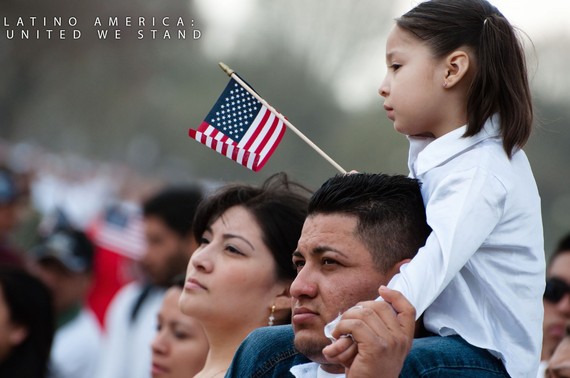Unless you avoid the news, you have likely heard about the comments Donald Trump made during his presidential campaign announcement regarding the quality of Latino immigrants arriving in the United States. Speaking specifically about Mexicans, Trump voiced an alarming view that Mexican immigrants are "bringing drugs... they're bringing crime... they're rapists." That was well over a month ago, and he shows no signs of slowing down with the toxic anti-immigrant rhetoric as we head into the first Republican primary debate this week. Thankfully, the response to Trump's remarks has ranged from mild mockery of his ignorance to shows of solidarity from major networks and influencers, both Latino and not.
As an attorney who works closely with Latino immigrants, not to mention that fact that I am the son of Latino immigrants, his comments came like a punch to the gut.
While on one hand the comments should be taken as little more than the bumbling of an eccentric billionaire, on another they raise the issue of how post-racial American society really is. That is to say, the bigotry of Trump's comments isn't something that's usually heard in public spaces, but it surely still exists in private ones -- a belief that all Latino immigrants have to offer the United States is drugs, crime and rape. This discounts the huge and ongoing, rich and positive contributions of Latino Americans to American culture on every level. What would American cuisine, music and fashion be without the influence of Latin Americans? Or more to Trump's point: without Latino purchasing power (which is slated to surpass onef trillion early in the next decade), where would the American economy be?
Contrary to Trump's bigoted opinion, Latino Americans are contributing to the U.S. economy in spades. A 2007 report from the White House Council of Economic Advisers concluded that immigration increases the U.S. GDP by roughly $37 billion each year, "because immigrants increase the size of the total labor force, complement the native-born workforce in terms of skills and education, and stimulate capital investment by adding workers to the labor pool." That's not counting the $18.8 billion contribution made to the economy by foreign students, and the $350.7 billion in sales and receipts from Latino-owned businesses each year. Maybe it isn't surprising that immigrants tend to start new businesses at twice the rate of native-born Americans; but maybe it is surprising that they're making waves on the startup innovation.The Trump-esque "Let's build a wall to keep 'em out" strategy is actually less likely to thwart imaginary rapists, and more likely to result in major losses to the GDP.)
But let's forget dollars and cents for a moment. What about the social, creative and cultural richness that Latino Americans have always brought and continue to bring to American culture? (By "Latino," I'm referring to the Hispanic ethnicity rather than any particular race, including Mexicans, Puerto Ricans, Colombians, Guatemalans, Cubans, Dominicans, Salvadorans and effectively anyone else who identifies as Latino.) We make up about 17% of the U.S. population, and we claim as our own world-movers like writer Isabel Allende, Nobel Prize winning physicist Luis Walter Alavarez, Supreme Court Judge Sonya Sotomayor, and ACLU Executive Director Anthony Romero. In film, we've brought you Robert Rodríguez, Alejandro González Iñárritu and Guillermo del Toro. In sports, Ted Williams, Miguel Cabrera and Oscar de la Hoya. In fashion, Carolina Herrera and Oscar de la Renta. American cuisine has been forever changed by the likes of César Ramirez, Michelle Bernstein and Elena Reygadas. The lists could go on.
But noting all the achievements and contributions of Latin Americans isn't enough to address the problem of Trump-esque commentary, because it's not just about what we are doing for America, but also about what America is doing for us. Latinos now make up the largest minority group in the U.S., and we vote at a high rate. Our spending power has risen almost 30% in just three years, to a level greater than the GDP of Mexico or Canada (causing Michael Barrera to call us "the second largest economy in North America"). Regardless of personal politics, that Latino America is a force to be reckoned with is a simple fact. How we vote, what we spend our money on, and other reflections of our values matter to the future of this country. The vast majority of politicians and leaders are aware of this; a few clearly are not.
The cultural legacy of Americanness is about freedom for many kinds of diversity, and the breadth of that diversity is growing all the time, as recent events in the Supreme Court have proven. I hope that Latinos aren't barred from feeling our worth and value as Americans, and continue to strive for the achievements that have made us so valuable. Likewise, I hope Latinos aren't made to feel disconnected from the country in which we live, and that we feel confident to claim Americanness, and to take pride in our American culture and our Latino culture at the same time -- because, of course, these are deeply and intractably linked. The maxim "United we stand, divided we fall" holds true for cultural identities, too: we are Latinos, and we are Americans. And whether Donald Trump likes it or not, his country is, among many other things, Latino America.
Also on HuffPost:


